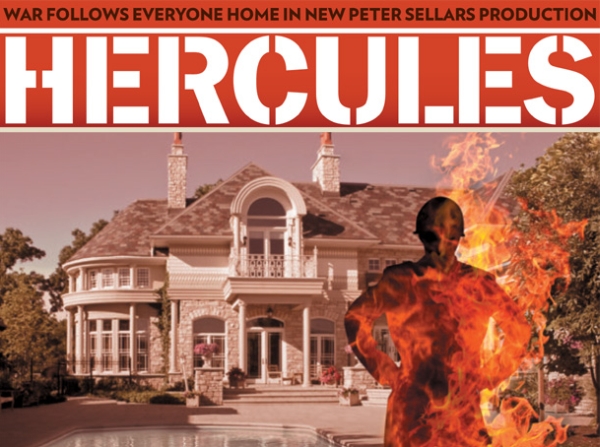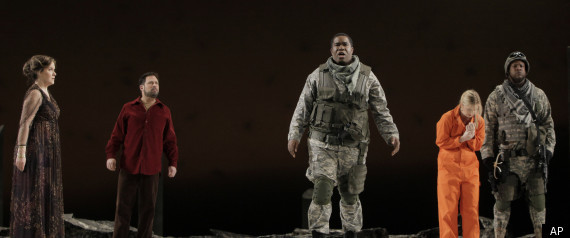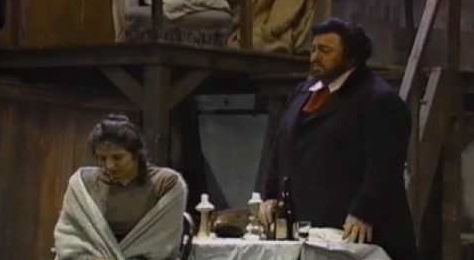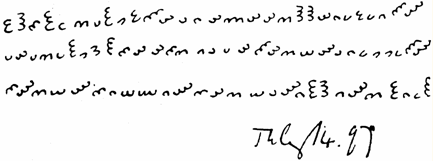aka Stuff Music People Like
You go to a friend’s concert/opera performance/chamber recital at an acclaimed school of music or summer festival. You’re invited to the party afterwards. There is wine, there is cheese, there’s a respectable collection of craft brews. There’s a strange mix of young people and old hangers-on, all of whom are way too intense and riled up because of the concert. There’s really awkward background music. Cathartic drinking abounds; inappropriate touching ensues.
You find yourself in a conversation with the type of people who want to talk about their favorite composers at a party. This is already bad news. Your instinct to retreat is a good one.
But let’s say you’re trapped next to the drink table, or you have a fighting spirit, or this is Imaginationland, and there are some hotties at an orchestra party who you want to impress. You need a list of composers who are Academy approved, under-appreciated, but not so outré that only the lamest of the music theory geeks has ever even heard of them.
I’m here to help.
1. J. S. Bach
No musician, be they orchestralist, vocalist, Old Music-ist, New Music-ist, keyboardist or lutenist will disparage the name of J. S. Bach.
If you say Bach, you leave yourself open to a discussion of his individual pieces. You can save yourself a lot of valuable time and listening by simply memorizing the letters BWV. BWV stands for Bach-Werke-Verzeichnis (which you don’t have to memorize) and refers to a listing of all Bach’s works. If pressed for an opinion on your favorite Bach piece, insert any three digit combination after the letters BWV. Do so with absolute confidence. Most musicians will think you’re talking about one of their own favorite pieces. Go with it. If not, they’ll assume you’re refering to some unknown masterwork and murmur in agreement. In the unlikely case that they don’t immediately follow this by offering their favorite Bach piece, ask them for it right away.
They will not respond with a BWV number. Do not press the issue.
2. Joseph Haydn
Musicians do love Mozart, but the ones who have heard “Eine Kleine Nachtmusik” in too many Julia Roberts wedding scenes tend to consider him a tad middlebrow. In either situation, you can never go wrong in expressing a preference for Haydn. Whether or not the people you’re talking to agree, they can’t help but respect this opinion.
Haydn’s a musicians’ musician. His symphonies are laced with a private wit, the kind that leads to much tittering over white wine at string quartet parties. Haydn is a strong way to start impressing classical musicians with your knowledge, but you will be wise to steer clear of any but the titled symphonies: “Surprise”, “Miracle”, and “London” will suffice.
3. György Ligeti
Show your flare for the avant-garde by working Ligeti into the conversation. Do not attempt pronunciation of his first name unless you are fluent in Hungarian. Mention that you think he stands out from the rest of the postwar European avant-garde. You can definitely mention Kubrick, but do not in any way insinuate that Ligeti composed scores for Kubrick’s films.
You’ll gain major points if you can think to mention what a visionary Alan Gilbert was to include “Le Grand Macabre” on the New York Philharmonic’s programing. If you really want to go for broke, say that you attended one of the performances. When asked for an opinion, simply say that it was “sick”.
4. Dmitri Shostakovich
Correct: Intense. Preludes & Fugues. Stalin.
Incorrect: Boring. Film scores. DSCH drinking game.
5. John Adams
that is, John Coolidge Adams, of “Nixon in China” and “Doctor Atomic” fame, not to be confused with John Luther Adams, who is best known for living in Alaska. It would not be a mistake to mention either composer’s name, however, but this is only recently true. In the past two years, Alex Ross has done much to improve the latter John Adams’ reputation, whereas before, everyone just thought he was a crackpot who made your life that little bit more annoying when you were looking for scores in the library. Better to stick to the former Adams though, and affix the term post-minimalist.
6. Modest Mussorgsky
Mussorgsky will be a surprise hit. If pressed, simply say, “Well, I love his operas”. Singers will be amazed. Theorists and Cultural Historians will be suitably impressed. Instrumentalists will only know “The Night on Bald Mountain”, but they all secretly love it and they will warm to you for reminding them of it.
Now. If you really, really want to go for broke, you can say the following: “I love Pictures, but I somehow feel like the original piano version actually has more color than any of the orchestrations when it’s performed well.” You are advised to leave the party immediately after deploying this gambit.
7. Franz Schubert
Say “Winterreise” (pronounced “vin-ter-rise-ah”), and really say it like you mean it. Express a heartfelt connection to it. You may express admiration for any symphony up through number 9, excepting number 7. If you do happen to slip up and mention the non-existent seventh, there are two recourses: 1) say that you assumed everyone had switched over to the new European numbering system for Schubert symphonies, or 2) say, “oh, I mean the ersatz seventh symphony. But we all know that story…”
8. Alexander Scriabin
Here’s what most musicians know about Scriabin, if they know anything at all: he was nuts and he had synesthesia (i.e. he heard music and saw colors). Few know that he was Russian. Because of this, they all tend to imagine that his music sounds way zanier than how it actually sounds, which is a lot like Debussy but more dissonant.
The one piece people know by Scriabin is “The Poem of Ecstasy”. Counter with “The Poem of Fire” (aka “Prometheus”). If the going gets really rough, there’s also “The Divine Poem”. At this point, nobody will have any idea what you’re talking about.
9. Carl Nielsen
Nielsen is perfect for your purposes: he’s the big romantic symphonist that everybody forgets about. The fact that nobody’s actually listened to his music will play strongly to your advantage, because everybody assumes they know enough (symphonist, Danish) to know what it sounds like. Let’s just say, people will be slightly bewildered but majorly impressed, which is exactly what you want.
10. Gustav Mahler
Young musicians have been inculcated in the culture of Mahler since they started playing in youth orchestras, and everyone is more than willing to overlook his deficiencies as a composer. Singers hate singing in his choruses, but love singing the solos. Young singers especially love singing his song cycles, because they get to feel like they’re singing Wagner without the longeur or the difficulty.
10 Composers Who You Should Never Admit Liking To A Musician Who Considers Him or Herself Serious
1. Leonard Bernstein
There will be almost no way to save face if you refer to Leonard Bernstein as a great, favorite, or otherwise serious composer in the wrong crowd. The only possible save is to say, “Hm? Oh, I thought we were talking about conductors – did Leonard Bernstein actually write music?” Still, you slipped pretty far.
2. Aaron Copland
If you accidentally say this composer’s name, the immediate and necessary remedy is to follow it with the phrase “Piano Variations”.
3. Johann Pachelbel
If you’re with Early Music People, Pachelbel is actually safe. I’ll hope for your own sake that you’ve done some serious pre-gaming before the party (and the concert) though.
4. Howard Shore
or: Danny Elfman, Jerry Goldsmith, James Horner, John Williams, or anyone named Newman. That’s not to say that all film composers are off the table, but proceed with caution. If you name Bernard Herrmann, be sure to precede it with, “Well, I love Alfred Hitchcock, so…” Other classic era film scorers are safe-ish, but don’t expect more than polite stares. Michael Giacchino is safe, but you’ll have to provide a lot of explanation and name check Alex Ross several times.
5. Nico Muhly
Unless you are in New York, singers and instrumentalists will generally not know who he is, but if you are in New York, there may be political ramifications to mentioning his name. Anywhere you go, composers within 10 years of his age will know enough to resent his career.
6. Alfred Schnittke
No one will know who he is. The very few who do will either a) not have been instructed what to think of him, b) will call him “Shit-ke” and chuckle, or c) will be a violist and will actually think you’re really cool, something you want to avoid at all costs.
7. Ron Nelson
or: Frank Ticheli, Norman Dello Joio, Morton Gould, Gordon Jacob, or anyone else primarily associated with Concert Band Music. The only exception to this rule is Percy Grainger, but only if you connect his name with the phrase “S&M freak”.
8. Antonio Vivaldi
The only possible way out of this slip is to use the following joke: “You know, everyone says that Vivaldi wrote the same piece 500 times, but it’s not true. He wrote the same piece 600 times.” This, in fact, will be a brilliant save, and the riskier among you may even find it worth attempting the flub.
9. Johann Strauss
Jr. or Sr., or any other member of the Strauss family, for that matter, up to and including Charles Strouse, but excluding Richard Strauss, even though his name is better left unmentioned anyway.
10. Niccolò Paganini
The only people who won’t scoff will be violinists. They’ll cringe.
[Disclaimer: I only vouch for this advice in mainland America. An entirely different set of rules may apply in Europe, especially in Germany. Use with caution.]
Discuss
If you want to. I’d love to hear more suggestions.



 —
—




